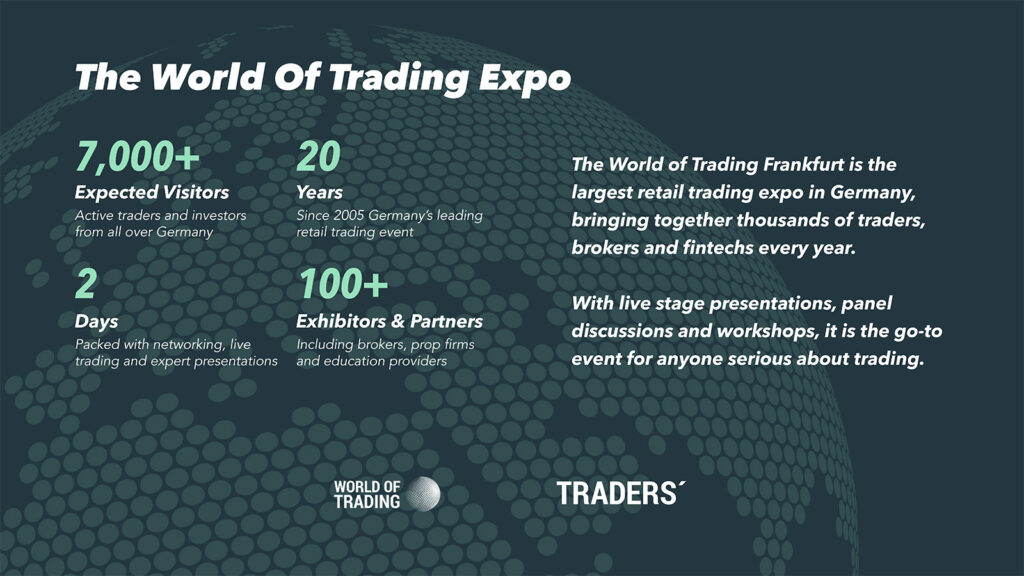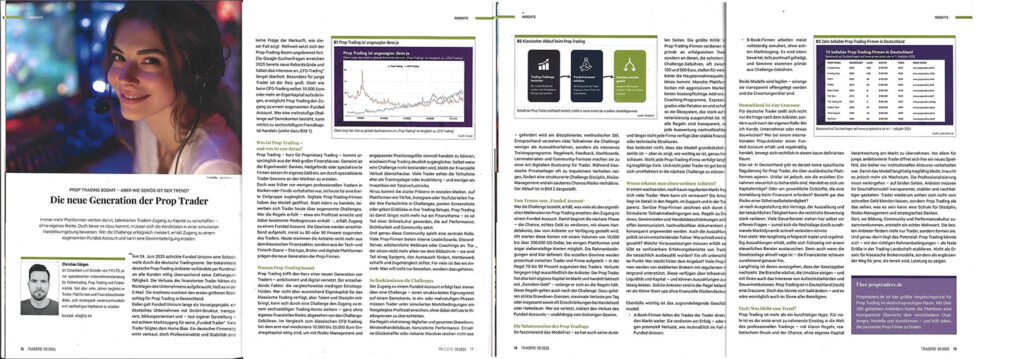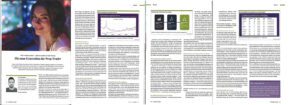The Ultimate Guide for Online Brokers to Grow in Germany in 2025
In this guide, we break down exactly how to enter the German market as an online broker — from understanding the local investor mindset to marketing strategies that actually convert in 2025.
Germany remains one of the most attractive markets for online brokers in Europe. The combination of an older, financially stable demographic and a mindset geared toward structure, planning and continuous improvement makes it a prime market for both long-term investing and active trading.
On the other hand, only 12.1 million people in Germany were active in the capital markets in 2024, according to the Deutsches Aktieninstitut — still a relatively small portion of the population.
Having worked with several leading online brokers over the past decade, I’ve seen firsthand how strong the demand from German-speaking traders and investors can be when approached the right way.
In this guide, I’ll walk you through the most effective marketing strategies to enter and grow in Germany and what pitfalls to avoid.
Understanding the German Trading Audience
While there are several initiatives aiming to attract more women to financial products, the reality for most online brokers in 2025 is clear: your core target audience is still predominantly male. In fact, between 80–100% of visitors and active clients tend to be men.
And despite Gen Z’s growing interest in finance (and their highly visible presence on social media) the bulk of your paying customers are older. The most valuable demographic consists of men aged 35 and above, primarily older millennials and boomers who have the income stability, risk appetite and interest to actively engage with trading and investing platforms.
Geographically, the strongest regions are in the South, but all major urban centers are equally relevant.

What Type of Content Resonates with German Traders?
German traders are especially drawn to indices, with the DAX being the undisputed favorite. There’s a dedicated community of DAX-focused traders who follow it closely and engage with every move — many of them gather around websites similar to DAXheute, which provides daily insights and updates on the index.
Beyond indices, German investors also show strong interest in:
- Gold and Oil (commodities in general)
- EUR/USD (the most watched currency pair)
- Bitcoin and any trending US tech stocks like Nvidia, Apple, Amazon
Local stocks are very important as well. German carmakers such as Volkswagen, BMW, Mercedes-Benz, and Porsche consistently attract attention — not just because of performance, but because they’re seen as national icons.
Blue chips like Bayer and Allianz are of particular interest, too. They consistently draw attention and offer great opportunities of news-driven content. And of course, stocks like Rheinmetall steal the spotlight whenever political headlines hit, perfect for short-term engagement.
Media Partnerships
Germany’s financial media landscape is fragmented and highly specialized. Some platforms focus on long-term investing, others on active trading. While many users move between both, it makes the most sense to focus your efforts on channels that speak directly to your core trading audience — especially when it comes to being found through passive marketing like SEO.
Based on experience, these are the go-to platforms that actually matter:

Finanztrends.de
Finanztrends is an up-and-coming news portal that has quickly built a strong community of active retail investors and traders. With a modern tone and a clear focus on lead generation, it’s ideal for campaigns targeting users interested in market commentary, stock tips, and education.
The big advantage? It’s a fresh audience that most brokers haven’t tapped into yet — making it a great opportunity for first movers.
Finanzmarktwelt.de
With Markus Fugmann as the face of the Finanzmarktwelt.de, it has built a loyal audience through daily video market updates and personal commentary. A good fit for brokers who rely on personalities and people-based marketing to build trust and engagement.
Stock3.com
Formerly known as GodmodeTrader, Stock3 offers a deep ecosystem of news, webinars, and education. Through their premium community, brokers can sponsor content, run webinars, or even explore integrations via their sister company Brokerize, allowing for white-label trading solutions.
Finanzen.net
Finanzen.net is Germany’s largest and best-known financial website. With millions of monthly visits, much of the traffic is driven by live prices, market news, and stock-specific searches. They dominate the SEO landscape for high-intent trading keywords and offer a variety of placements: from webinars and sponsored content to push notifications and custom integrations.
Conferences and Events in Germany
Retail Investing Expo “Invest” in Stuttgart
In-person events still play a major role in the German market. There’s a strong cultural preference for face-to-face experiences, and financial conferences remain a key part of this — both for education and networking.
One of the most important events is the Invest Messe in Stuttgart, typically held in April. It’s the largest retail investing event in Germany, attracting a broad mix of participants over two exhibition days. The program includes keynote panels, live workshops, and dozens of exhibitor booths.
The crowd is equally diverse; ranging from major financial institutions and asset managers to fintech startups, trading educators, and influencers. This makes Invest Stuttgart a hybrid event, with both B2B and B2C focus.
Trading Expo “World of Trading” in Frankfurt
When it comes to trading-focused events in Germany, nothing beats the World of Trading in Frankfurt. Held annually in November, this expo has been the flagship event for active traders for over 20 years.
Organised by the publishers of TRADERS magazine — a monthly print publication with thousands of paid subscribers — the event attracts a highly targeted audience.
All major players in the trading space exhibit here, including brokers, prop firms, fintech and education providers. It’s the ideal setting to position your brand directly in front of one of the most engaged trading communities in Europe.
Important: Demand for booth space is high, and spots fill up fast. If you’re planning to be present, make sure to start early and secure your placement well in advance!

Börsentage – Regional Events with Strong Reach
Another excellent opportunity to connect with German-speaking investors is the Börsentage event series. These regional investor fairs take place in various cities across Germany — including Munich, Dresden, Hamburg, and Frankfurt — as well as in Vienna, Austria.
The Börsentage events attract both long-term and short-term investors and traders alike, making it a strong fit for brokers with a diversified product range.
Among the most popular are Börsentag München and Börsentag Dresden, both of which draw high-quality attendance and strong media attention.
If your goal is to build brand awareness, engage with a more traditional investor audience, or simply test regional interest, Börsentage provides a cost-effective and targeted way to do just that.
Affiliates & Influencers
As in most regions, affiliates and influencers play a key role in customer acquisition in the DACH market. But picking the right ones can be tricky, especially if you don’t speak the language or fully understand the content they produce.
Many German-speaking influencers are already tied to existing broker partnerships, and it can be difficult to break in without the right connections.
Over the years, we’ve built a curated network of trusted partners and can help you identify the right affiliates based on your growth stage — including which ones are currently open to new deals.
If you’re just getting started, you might also consider working with a local affiliate network. The largest in this space is FinanceAds, which gives you instant access to over 15,000 active affiliates through their platform.
Competitive Broker Landscape in Germany
Entering the lucrative German market (or expanding your share) is no easy task. While there are clear opportunities, expectations need to be realistic. The landscape is fragmented, competitive, and far from a “winner takes all” environment. Many players have been around for years, building strong brand recognition and earning the trust of retail traders.
If you’re planning to compete here, it’s essential to understand who you’re up against.

Multi-Asset Brokers
- Comdirect
Comdirect is an online bank that also provides brokerage services. It offers a combined solution for banking and trading, making it a practical choice for retail investors who prefer a unified platform. - Lynx Broker
Lynx is a multi-asset broker that gives users access to a wide range of financial instruments, including stocks, options, futures, CFDs, crypto, and ETFs. It targets experienced traders who require access to international markets. - Flatex Degiro
Flatex Degiro is one of the largest direct brokers in Europe. It operates at scale with a focus on low-cost trading and serves a diverse client base, including both long-term investors and active traders across several European countries. - Smartbroker
Smartbroker is a German brokerage platform that provides access to major domestic exchanges and a broad range of asset classes, including stocks, ETFs, funds, and derivatives. It is operated by Smartbroker Holding AG, which also owns several financial media outlets such as wallstreet-online.de and boersennews.de.
These platforms have long been part of the trading ecosystem in Germany. With institutional backing and a more traditional approach, they operate on a different level compared to newer fintechs.
Neo Brokers
- Scalable Capital
Scalable Capital has evolved into a brokerage platform for personal investing, with a strong focus on ETFs. It offers users access to a wide range of exchange-traded products and savings plans, appealing primarily to cost-conscious, long-term investors. - Trade Republic
Trade Republic is a mobile-first broker designed for ease of use and low fees. Its app-based interface and focus on simple pricing structures have made it especially popular among younger, tech-savvy investors. - finanzen.net zero
finanzen.net zero is a low-cost brokerage affiliated with the financial news portal finanzen.net. The platform leverages its media connection for visibility and is expanding its user base through competitive pricing and simplified trading access.
Certificates: The Real Competition
The biggest threat to CFD brokers often isn’t other brokers — it’s Zertifikate. These are bank-issued derivatives with built-in leverage and a more favorable public image. Because they’re distributed through traditional banks and listed exchanges, many German traders perceive them as safer and more transparent, even though the risk is similar to CFDs.
10 CFD Brokers Actively Targeting the German Market
| CFD Broker | More than CFDs | German Office | USP | Most visible Marketing |
| eToro | Yes | Yes | Social Trading | Sponsorships & Digital |
| XTB | Yes | Yes | Interest on cash | Market Updates & Webinars |
| IG | Yes | Yes | Pioneer Broker | Events |
| Pepperstone | No | Yes | Low Pricing | TradingView |
| GBEbrokers | No | Yes | German CFD broker | Affiliates |
| Forex.com | No | No | Institutional Background | Trading Academy |
| WH SelfInvest | Yes | Yes | Futures Trading | Expos & Webinars |
| Capital.com | No | No | All-in-One Platform | Affiliates & SEO |
| Admirals | Yes | No | Low Pricing | SEO |
| Naga | Yes | Yes | All things money | Borussia Dortmund |
There are hundreds of brokers actively targeting the German market through digital marketing and other advertising efforts. This table is not a ranking, but rather a snapshot highlighting the diversity of companies and their different marketing approaches. It does not reflect marketing success either; it simply illustrates where these brokers are currently most visible from my perspective.
Avoid these Mistakes
Language and Localisation
One of the biggest mistakes international brokers make when entering the German market is underestimating the importance of language.
While younger generations often speak English fluently, many older users represent a more affluent and active investor base and never learned English in school. Relying solely on English-language content creates friction and limits your reach.
Beyond accessibility, offering your platform, support, and content in German signals commitment. It shows clients you’re serious about the market and not just trying to extract value without investing in the local experience.
A fully localized customer journey, ideally with German-speaking employees and a local presence, builds trust — and ultimately improves conversion and retention. If you want to be taken seriously in Germany, speaking the language isn’t optional. It’s expected.
Don’t Just Copy-Paste What Worked Elsewhere
One of the most common mistakes brokers make when entering the German market is trying to apply the exact same strategies that worked elsewhere.
Even within Europe, cultural and structural differences are significant. Take the UK, for example — it has a highly developed financial media landscape. In Germany, that same content style usually does not perform. Why? Because financial literacy levels are much lower. The average German retail investor isn’t used to fast-paced, jargon-heavy messaging.
Then there’s the question of geography. In London, you can launch a big OOH campaign in the Tube and hit a concentrated audience of professionals. In Germany, that’s not how things work. The country’s federal structure means there isn’t one central hub — there are four or five urban regions you need to target individually to make the same impact. And contrary to popular belief, Berlin is not your best bet. Cities like Munich, Hamburg, Stuttgart, Frankfurt and Düsseldorf often yield better results when it comes to financial services.
To succeed in Germany, you need to go local — not just with language, but with messaging, media choices, and regional focus.
Get It Right From the Start in Germany
Breaking into the DACH region without local insight is a fast track to burning budget and missing your targets. We’ve seen too many brands try to figure it out on the fly — and pay the price for it.
If you’re serious about entering the German-speaking market, save yourself time, money, and frustration by talking to us first. We can connect you with the right partners, help you pre-select reliable local service providers, and make sure every euro you spend actually moves the needle.
Start With a 1-on-1 Consulting Call
Planning to enter the German market or grow your trading brand? Let’s talk strategy and growth.

You Might Also Like
The New Generation Of Prop Traders
This article was originally published in the September 2025 edition of TRADERS magazine. The version below is an English translation…
Marketing Budget Allocation 2026
With 2026 approaching quickly, now is the time as an Online Broker or Prop Firm to set your marketing priorities…
What’s In For Prop Trading? My predictions for 2026
Prop trading is booming because it solves a problem traditional brokers can't. Beginners want to trade, but they cannot afford…
Dead Props: Over 100 Prop Firms Have Already Disappeared in 2025
Prop firms are easy to launch and often just as quick to disappear. More than 100 prop trading websites went…
The New Generation Of Prop Traders
This article was originally published in the September 2025 edition of TRADERS magazine. The version below is an English translation…
Marketing Budget Allocation 2026
With 2026 approaching quickly, now is the time as an Online Broker or Prop Firm to set your marketing priorities…
What’s In For Prop Trading? My predictions for 2026
Prop trading is booming because it solves a problem traditional brokers can't. Beginners want to trade, but they cannot afford…
Dead Props: Over 100 Prop Firms Have Already Disappeared in 2025
Prop firms are easy to launch and often just as quick to disappear. More than 100 prop trading websites went…







